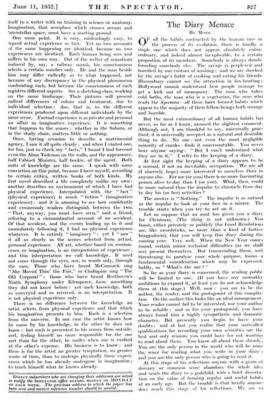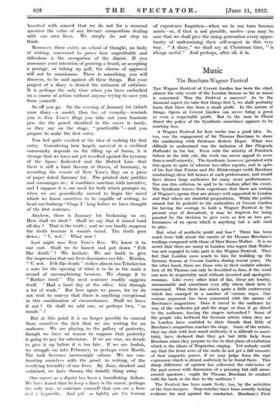The Diary Menace
BY MOTH.
Oall the habits contracted by the human race in the process of its evolution, there is hardly a single one which does not appear absolutely extra- ordinary, and indeed almost inexplicable, to a certain proportion of its members. Somebody is always dumb- founding somebody else. The savage is perplexed and horrified by our custom of washing ; and we are shocked by the savage's habit of cooking and eating his friends. Bloomsbury cannot see the attraction in fox-hunting ; Hollywood cannot understand how people manage to get a kick out of monogamy. The man who takes cold baths, the man who is a vegetarian, the man who reads the Spectator—all these have formed habits which appear to the majority of their fellow-beings both strange and horrible.
But the most extraordinary of all human habits has never, so far as I know, aroused the slightest comment. Although not, I am thankful to say, universally prac- tised, it is universally accepted as a natural and desirable thing to do. No one—not even the most negligible minority of cranks—finds it unaccountable. You never hear anyone saying : "But I can't understand what they see in it." I refer to the keeping of a diary.
At first sight the keeping of a diary appears to be a normal, if not an inevitable, occupation. We are all (I sincerely hope) more interested in ourselves than in anyone else. For me (or you) there is no more fascinating person alive to-day than I (or you). What, then, could be more natural than the impulse to chronicle from day to day his (or her) activities ?
The answer is "Nothing." The impulse is as natural as the impulse to look at your face in a mirror. The trouble starts when you try to act on it.
Let us suppose that an aunt has given you a diary for Christmas. (The thing is not unknown.) You boast, either privately or publicly (for Good Resolutions are, like swordsticks, no more than a kind of furtive braggadocio), that you will keep this diary during the coming year. Very well. When the New Year Comes round, certain minor technical difficulties (as we shall see) present themselves. But transcending them, and threatening to paralyse your whole purpose, looms a fundamental consideration which may be expressed, baldly, as " What's the use ? "
So far as your diary is concerned, the reading public will be limited to one. (If you have any unworthy ambitions to expand it, at least you do not acknowledge them at this stage.) Well, now : you are to be the author, the reader, and the protagonist of this compila- tion. On the surface this looks like an ideal arrangement. Your reader cannot fail to be interested, nor your author to be reliable ; and as for your protagonist, you have always found him a highly sympathetic and dramatic character. But preiently you begin to have your doubts ; and at last you realize that your unrivalled qualifications for recording your own activities arc the best and only reasons you could have for not wanting to read about them. You know all about them already. You are the only person in the world who will be none the wiser for reading what you write in your diary ; and you are the only person who is going to read it. At this stage of his reflections anyone with a grain of decency or common sense abandons the whole idea and sends the diary to a godchild, with a brief disserta- tion on the value of forming regular and useful habits at an early age. But the trouble is that hardly anyone does reach this stage of his reflections. We are so besotted with conceit that we do not for a moment question the value of any literary composition dealing with our own lives. We simply do not stop to think.
Moreover, there exists no school of thought, no body of writing, concerned to prove how unprofitable and ridiculous is the occupation of the diarist. If you announce your intention of growing a beard, or accepting a peerage, or taking up golf, the chorus of approval will not be unanimous. There is something, you will discover, to be said against all these things. But your project of a diary is denied the catharsis of criticism. It is perhaps the only time when you have embarked on a course of action without anyone trying to save you from yourself.
So off you go. On the evening of January 1st (which your diary—a model, thus far, of veracity—reminds you is New Year's Day) you take out your fountain pen—for the pencil sheathed in the cover is rarely, as they say on the stage, "practicable "—and you prepare to make the first entry.
You feel quite excited at the idea of making the first entry. Considering how largely survival in a civilized community depends on the filling up of forms, it is strange that we have not yet revolted against the tyranny of the Space Indicated and the Dotted Line—that there is still a faint flavour of fitness, of harmony, in recording the events of New Year's Day on a piece of paper dated January 1st. The printed date justifies and encourages us ; it combines sanction with incentive, and I suppose it is our need for both which prompts us, when we are periodically moved to begin the novel which we know ourselves to be capable of writing, to head our foolscap "Chap. I" long before we have thought of the first sentence.
Anyhow, there is January 1st beckoning us on. How shall we start ? Shall we say that it rained bard all day ? That is the truth ; and we can hardly suppress the truth because it sounds banal. The truth goes down : "V. wet." What now ?
Last night was New Year's Eve. We know it to our cost. Shall we be honest and put down "Felt like death " ? We hesitate. We are loath to give the impression that our liver dominates our life. Besides, "V. wet. Felt like death "strikes almost too Tchekovian a note for the opening of what is to be in the main a record of uncomplaining heroism. We change it to "Bather tired." The next sentence readily suggests itself. "Had a hard day at the office. Got through a lot of work." But here again we pause, for we do not wish to convey that there is anything exceptional in this combination of circumstances. Shall we leave it out ? Or shall we add one, or perhaps two, "as usuals " ?
But at this point it is no longer possible to conceal from ourselves the fact that we are writing for an audience. We are playing to the gallery of posterity, though we have no reason to suppose that posterity is going to pay for admission. If we are wise, we decide to give it up before it is too late. If we are foolish, we struggle on into February, or perhaps even March.
The task becomes increasingly odious. We are con- fronting ourselves with the proof, in writing, of the terrifying triviality of our lives. By June, shocked and
saddened, we • have -thrown iietistly 'thing- -away. :
Our career as a diarist has been a humiliating failure. We have learnt that to keep a diary is the surest, perhaps the only way, to convince yourself that you are a bore and a hypocrite. And yet - so lightly are the lessons
of experience forgotten—when we in our turn become aunts—or, if that is not possible, uncles—you may be sure that we shall give the rising generation every oppor- tunity of undermining their self-respect in this very way. "A diary," we shall say at Christmas time, "is always useful." And perhaps, after all, it is.



































 Previous page
Previous page